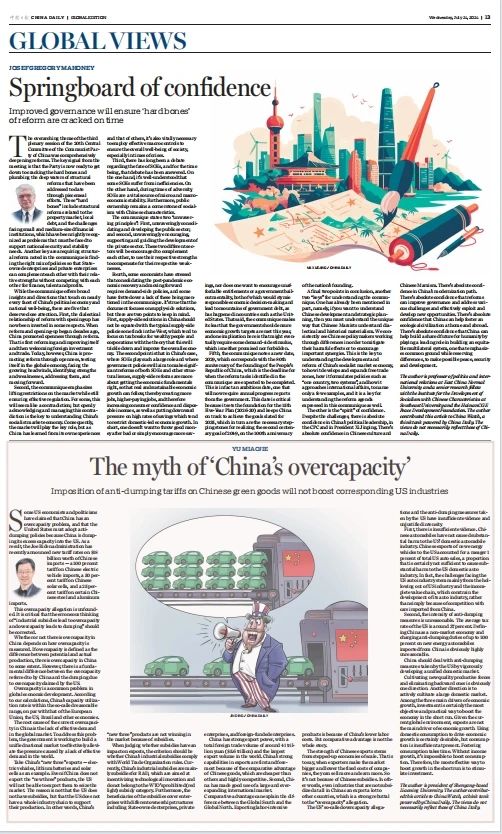2024年7月24日,中国日报(CHINA DAILY)发表了国际经济学会会士,辽宁大学党委副书记、校长余淼杰教授的文章《中国产能过剩之谜》。文章纠正了“产业补贴导致产能过剩,产能过剩导致倾销”的错误观念,指出中国的工业补贴符合世界贸易组织的规定,并强调中国出口优势源于规模经济和国际市场的扩展。文章建议中国应大力发展国内统一市场,以应对美国的贸易限制措施。原文如下:

The myth of 'China's overcapacity'
Imposition of anti-dumping tariffs on Chinese green goods will not boost corresponding US industries
YU MIAOJIE
July 24, 2024
Some US economists and politicians have claimed that China has an overcapacity problem, and that the United States must adopt anti-dumping policies because China is dumping its excess capacity into the US. As a result, the Joe Biden administration has recently announced new tariff rates on $18 billion worth of Chinese imports — a 100 percent tariff on Chinese electric vehicle imports, a 50 percent tariff on Chinese solar cells, and a 25 percent tariff on certain Chinese steel and aluminum imports.
This overcapacity allegation is unfounded. It is critical that the erroneous thinking of "industrial subsidies lead to overcapacity and overcapacity leads to dumping" should be corrected.
Whether or not there is overcapacity in China depends on how overcapacity is measured. If overcapacity is defined as the difference between potential and actual production, there is overcapacity in China to some extent. However, there is a fundamental difference between the overcapacity referred to by China and the dumping due to overcapacity claimed by the US.
Overcapacity is a common problem in global economic development. According to our calculations, China's capacity utilization rate is within the so-called reasonable range, on par with that of the European Union, the US, Brazil and other economies.
The root cause of the current overcapacity in China is the lack of effective demand in the global market. To address this problem, the government is working to build a unified national market to effectively alleviate the pressure caused by a lack of effective demand in the world.
Take China's "new three" exports — electric vehicles, lithium batteries and solar cells as an example. Even if China does not export the "new three" products, the US will not be able to export them to seize the market. The reason is not that the US does not have subsidies, but that the US does not have a whole industry chain to support their production. In other words, China's "new three" products are not winning in the market because of subsidies.
When judging whether subsidies have an impact on exports, the criterion should be whether China's industrial subsidies comply with World Trade Organization rules. Currently, China's industrial subsidies are mainly subsidies for R&D, which are aimed at incentivizing technological innovation and do not belong to the WTO's prohibited (red light) subsidy category. Furthermore, the beneficiaries of the subsidies cover enterprises with different ownership structures including State-owned enterprises, private enterprises, and foreign-funded enterprises.
China has strong export power, with a total foreign trade volume of around 41 trillion yuan ($5.6 trillion) and the largest export volume in the world. China's strong capabilities in exports are first and foremost because of the comparative advantage of Chinese goods, which are cheaper than others and highly competitive. Second, China has made good use of a large and ever-expanding international market. Comparative advantage can explain the difference between the Global South and the Global North. Exporting labor-intensive products is because of China's lower labor costs. But comparative advantage is not the whole story.
The strength of Chinese exports stems from stepped-up economies of scale. That is to say, when exporters make the market bigger and lower the fixed costs of companies, they can sell more and earn more. So it's not because of Chinese subsidies. In other words, even industries that are not subsidized at all in China can export a lot to other countries, which is a strong rebuttal to the "overcapacity" allegation.
The US' so-called overcapacity allegations and the anti-dumping measures taken by the US have insufficient evidence and unjustified intensity.
First, there is insufficient evidence. Chinese automobiles have not caused substantial harm to the US' domestic automobile industry. Chinese exports of new energy vehicles to the US accounted for a meager 1 percent of total US auto sales, a proportion that is certainly not sufficient to cause substantial harm to the US domestic auto industry. In fact, the challenges facing the US auto industry stem mainly from the hollowing out of US industry and the incomplete value chain, which constrain the development of its auto industry, rather than simply because of competition with cars imported from China.
Second, the intensity of anti-dumping measures is unreasonable. The average tax rate of the US is around 37 percent. Defining China as a non-market economy and charging anti-dumping duties of up to 100 percent on new energy automobiles imported from China is obviously highly unreasonable.
China should deal with anti-dumping measures taken by the US by vigorously developing a unified domestic market.
Cultivating new quality productive forces and eliminating backward ones is obviously one direction. Another direction is to actively cultivate a large domestic market. Among the three main drivers of economic growth, investment is certainly the most objective and practical way to boost the economy in the short run. Given the current global environment, exports are not the main driver of economic growth. Using domestic consumption to drive economic growth is certainly desirable, but consumption is insufficient at present. Fostering consumption takes time. Without income growth, it's impossible to boost consumption. Therefore, the most effective way to boost growth in the short run is to stimulate investment.
作者简介
余淼杰,男,汉族,1976年生,教授,博士生导师,美国戴维斯加利福尼亚大学经济学博士,现任第十四届全国人大代表、国家监委特约监察员、辽宁省人大常委会委员、辽宁省人大立法委委员、辽宁大学党委副书记、校长。是联合国国际经济学会(IEA)会士,长江学者特聘教授(2019年)、首届青年长江学者(2015年)、国家杰青基金获得者、北京市卓越青年科学家、北京大学博雅特聘教授、 商务部经贸政策咨询委员、财政部“中美研究智库联盟”理事、俄罗斯伊尔库茨克国立大学名誉教授、俄罗斯联邦财政金融大学国际顾问理事。系中国世界经济学会副会长、中国数量经济学会副会长、中国工业经济学会副理事长、全国港澳研究会副会长、辽宁省社科联副主席、黄廷方/信和青年杰出学者、全球经管类前1%高引论文经济学者,也是迄今为止唯一获得“英国皇家经济学奖”的华人学者。被联合国、亚洲发展银行、财政部、商务部、国务院参事室和多个地方政府聘为专家顾问,被专门邀请到联合国总部做中国经济发展报告。享受国务院政府特殊津贴。
余淼杰教授研究领域为国际贸易和中国经济发展,曾在Economic Journal、Review of Economics & Statistics、Journal of International Economics、Journal of Development Economics、《经济研究》《管理世界》等国内外顶级、一流期刊上发表论文近二百篇,出版中英德文专著、教材、时评随笔27部。任国际著名学术期刊Review of International Economics 副主编,商务部《国际贸易》名誉主编,《辽宁大学学报》主编、《日本研究》主编、《长安大学学报》执行主编。
曾获得教育部哲学社科优秀成果奖(三次)、北京市哲学社科优秀成果奖、吴玉章人文社科研究奖、张培刚发展经济学奖,安子介国际贸易研究奖(五次)。代表著作《加工贸易与企业生产率》获刘诗白经济学奖、胡绳青年学术研究奖、全国贸易发展研究奖、中国青年经济学家奖、辽宁省哲学社会科学奖成就奖等。
在北大百廿校庆中,作为优秀中青年教师代表受到习近平总书记的专门接见。作为国家杰青25周年优秀代表参加时任国务院总理李克强主持的高规格座谈会。
2024年作为全国人大青年代表团成员(共8名)访问俄罗斯联邦议会及地方杜马。
